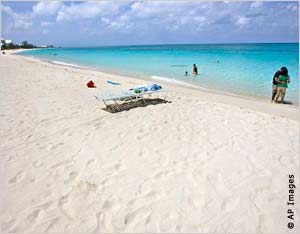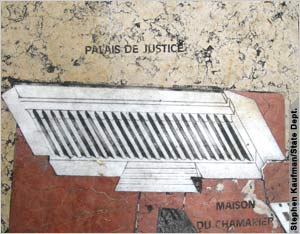[guest name="Corey Hewitt" biography="Corey Hewitt works for the Department of Health and Human Services and is a resident of Washington, D.C. He describes his recent experience being called for jury duty."]
 Most people dread a summons for jury duty. It’s usually seen as an interruption of normal daily life. But for me, jury duty seemed like a break from my normal, hectic routine.
Most people dread a summons for jury duty. It’s usually seen as an interruption of normal daily life. But for me, jury duty seemed like a break from my normal, hectic routine.
I was at the court house well ahead of my 8:00 a.m. required arrival time, early enough to avoid any long security lines at the entrance. I checked in and was told to wait in the jurors’ lounge, a room with five televisions playing a morning news program. I was also given two information sheets: one for emergency evacuations, the other with common questions and answers.
There was also a business office for jurors to use – only three others were there when I checked it out. It was very quiet in the room with eight desks, a copier/fax machine, wireless and modem Internet access. Actually, all juror waiting areas featured wireless Internet. I’m a people watcher, so the business office felt too secluded for me.
After a while, everyone was called into the lounge for a briefing. The briefing was a 20-minute slide show. It explained what to do if you had conflicts that would prevent serving as a juror and also gave details of the selection process and appropriate juror behavior and actions.
After the briefing, a clerk put on a movie, “The Net.” Five minutes into the movie, I started thinking about going back to the business office. The clearing of throats, coughing, various smells and a man talking on his cell phone despite a no-cell-phones-in-the-lounge rule, were all getting on my nerves. “Sir, you’re supposed to go out to the hall,” I told him. He replied with “yeah, I get it” as he stood up and walked out.
After a little more than two hours, a long list of jurors was called for a panel (my name not included on the list.) They were told to meet in the hall for further instruction. Why were they chosen? Why wasn’t I chosen? Where are they going? What are they doing? What trials might they get to hear? I wanted to know!
Next movie for our waiting entertainment was “My Big Fat Greek Wedding”. Four and a half hours into the juror selection waiting process, the movie got interrupted by an announcement that there will be another panel selection. We were instructed that if our name and jury number were called, to meet in the hall for further instructions. I heard my name! I was excited, thinking this would be my chance to at least be considered!
As instructed, we waited in the hall. I’ve always wanted to be on a jury, to personally see our judicial system at work. I was excited and hoping that I would make it through the selection process and be able to sit on a trial, fulfilling my civic duty. But then the clerk announced that we were free to leave.
Many people were happy with the announcement. I wondered if there was anyone else that felt the disappointment I did. Although I wasn’t selected, I have to trust that the jury selection process has enabled the trials held today to have jurors with open minds, honest opinions and fair observations.
For more information on the U.S. judicial system, see Anatomy of a Jury Trial.

 Most people dread a summons for jury duty. It’s usually seen as an interruption of normal daily life. But for me, jury duty seemed like a break from my normal, hectic routine.
Most people dread a summons for jury duty. It’s usually seen as an interruption of normal daily life. But for me, jury duty seemed like a break from my normal, hectic routine.  So far, a case of different nations/different standards. Plaintiffs, of course, frequently choose to sue authors and publishers in Britain — known to some as “Club Med for Libel Tourists.” But again, different countries/different laws, right?
So far, a case of different nations/different standards. Plaintiffs, of course, frequently choose to sue authors and publishers in Britain — known to some as “Club Med for Libel Tourists.” But again, different countries/different laws, right? But in France, the judicial system is designed to prevent this kind of drama. I met a forensic evidence specialist in Lyon who is often called as an expert witness and researcher for criminal trials, and she says that unlike in the United States, most of the work in criminal cases is completed before the trial ever gets underway. Thus, there are few surprises. But there are more important things than pleasing the crowd, right?
But in France, the judicial system is designed to prevent this kind of drama. I met a forensic evidence specialist in Lyon who is often called as an expert witness and researcher for criminal trials, and she says that unlike in the United States, most of the work in criminal cases is completed before the trial ever gets underway. Thus, there are few surprises. But there are more important things than pleasing the crowd, right?